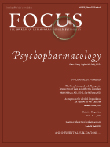Suicidal Ideation and Pharmacotherapy Among STEP-BD Patients
Abstract
Objective: Little is known about the effects of lithium on suicidal ideation or about the possible antisuicidal effects of divalproex, second-generation antipsychotics, or antidepressants among persons with bipolar disorder. Methods: Using a cross-sectional design, the authors examined patterns of psychotropic drug use relative to suicidal ideation among 1,000 patients with bipolar disorder in the National Institute of Mental Health’s Systematic Treatment Enhancement Program for Bipolar Disorder (STEP-BD). Results: The presence of suicidal ideation was similar between patients who were taking any lithium and those who were not (22.2 percent and 25.8 percent, respectively) and between those who were taking any divalproex and those who were not (20.3 percent and 21.5 percent). Suicidal ideation was significantly more prevalent among patients who were taking a second-generation antipsychotic than those who were not (26 percent and 17 percent) and those who were taking an antidepressant and those who were not (25 percent and 14 percent). After other variables had been controlled for, lithium prescriptions were significantly more common among patients who had suicidal ideation. Conclusions: Among patients with bipolar disorder who have suicidal ideation, antidepressants and second-generation antipsychotics appear to be prescribed by community practitioners more often than other medications, with lithium reserved for those with more severe illness characteristics.



